#italian queer history
Text
''Fuori! Mensile di Liberazione Sessuale!"
Of course, I said page two was coming soon, and then I got distracted. The wait will be worth it though, I promise.
So here we go! Page two! This was a bit shorter, thankfully.
In this episode: perhaps the first use of the word ''discourse''?
And the manifesto of one of the first gay movements in Italy, FUORI!
The column on the left is mostly crediting the people who worked on the magazine, but there's one interesting bit.

FUORI! is a COPYRIGHT FREE magazine - replication of the articles is free, as long as FUORI! is credited.
‒‒‒‒‒‒‒‒‒‒‒‒‒‒‒‒‒‒‒‒‒‒‒‒‒‒‒‒‒‒‒‒‒‒‒‒‒‒‒‒‒‒‒‒‒‒‒‒‒‒‒‒‒‒‒‒
So this magazine is completely free to copy and repost, which makes sense considering it's a Marxist magazine, but I'm still surprised and impressed!
I mean, I wasn't doubting the legality of posting a magazine from the 70s, but it's still good to know that I'm doing exactly what they would have wanted.
Page 2: Who speaks for the homosexuals?

A ''new'' magazine poses questions not only to its readers but also to those who write it.
When we imagined FUORI! the first question we asked ourselves was this: Who are we talking to? Actually, who has ever spoken for the homosexuals? Who has ever shouted with the homosexuals?
Many, so many, too many, had things to say and recall, to write and analyze, to resume and conclude about homosexuals and, when deemed appropriate, for homosexuals.
Nobody ever went beyond their suggested analysis, the synthesis obtained by maneuvering and manipulating.
Because it's clear that we aren't making "just another'' magazine, we're starting a completely new discourse, which wishes to open, with an explosion of joy and rage, a new process of liberation.
So: who will read us? But also: why us? It was discovering that there isn't a contradiction between the two questions that gave us the strength (a lot of it, believe us) to start.
Today we reject those who speak for us. Their discipline isn't our shock motion, and what they gain is where we start from to break with the Past.
The answer to the question in the title is fundamental to finally leave the condition of ''object'' in which we homosexuals find ourselves in. ''We'' homosexuals, not just you who's reading, but also we who are writing. Your condition is ours, your oppression is ours, and the repression we bear is common.
For the first time, homosexuals speak to other homosexuals. Openly, with pride, they declared themselves as such[1]. For the first time, the homosexual enters the scene as a protagonist and handles the story in the first person (well or badly doesn't matter, it's the formal values that interest us).
He speaks about himself to those who are like him, breaking the commodifying relationship ''object to be consumed-consumer". Nobody will tell us what we are and how we are, from shitty magazines who treat us like lab rats.
The great awakening of homosexuals has started. It was many others' turn first, Jews, Blacks[2] (Remember?), now it's our turn. And our awakening will be immediate, contagious, and beautiful.
Working in a liberation movement represents an exciting experience, full of new meaning. We're changing our lives, we're rediscovering sensations we thought were impossible to feel, and we feel homosexual with our heads up high and not just among ourselves, it was already like this among us, but among others as well, especially among others.
Liberation starts in the moment when we realize homosexuality is beautiful and must be shouted out, never hidden again.
In this magazine, you'll find the word HOMOSEXUAL repeated infinite, infinite times. And we'll repeat it more and more, until the day when its profound sense of beauty will be liberated.
Now a few words on the magazine. The property you see credited (F.E.S., FUORI! Editorial Society) is formed by the collective FUORI!, by all of us who wrote the magazine and paid for it.
If FUORI! will sell, we'll continue it; if not, we'll close. We don't have a bossman, nobody finances us (one day we'll tell the story of our search for money, obviously negative, and we'll believe it'll be an instructive tale).
ANGELO PEZZANA[3]
‒‒‒‒‒‒‒‒‒‒‒‒‒‒‒‒‒‒‒‒‒‒‒‒‒‒‒‒‒‒‒‒‒‒‒‒‒‒‒‒‒‒‒‒‒‒‒‒‒‒‒‒‒‒‒‒
[1]: Not sure who ''they'' is;
[2]: I stand corrected, they did have another word for black people. Also, Angelo Pezzana, the founder of the FUORI! Association, is still alive, but to my knowledge he's not Jewish nor black, so I disagree with the idea that black people and Jewish people had achieved liberation in the 70s;
[3]: So, yeah, this article makes me weirdly emotional. FUORI! was one of the first gay liberation movements in Italy, so this is basically one of the first attempts of queer liberation in Italy. This isn't just a random magazine, it's a historical record of the start of queer liberation.



The occasion
On April 15th, 1971, the newspaper ''La Stampa di Torino'' published an article by prof. Andrea Romero about homosexuality, ''burning issue of the current times.''
Looking for the reason why an occasion so trivial as Romero's article, definitely not more unfounded and anti-critical than many other ''serious'' publications, aroused the will to take a stance in the Turin group, would be a fascinating adventure.
Fascinating, but perhaps useless and, here, definitely out of place. The fact remains that to Romero's article's:
"...poor homosexuals, so psychotic, so neurotic and unhappy and blah, blah, blah... but so curable, if only they wanted to become heterosexuals. We're here, psychiatrists and psychoanalysts, D'aquino's here too[4], no? Come to us!!"
a group of Turin homosexuals reacted and decided the bullshit on the topic was too much, that they needed to end or be at least neutralized with some critical and socially responsible discourse.
But they started with the usual mistake, due to the good faith of those who think an honest discourse is receivable on every level.
They prepared a nice response letter to Romero's article, they asked people in high levels of socio-political work to co-sign, and they sent it, hopeful, to La Stampa for publication.
But the publication didn't come. The response letter from La Stampa was very gracious, super polite, but of strict denial. The refusal was motivated with "...and plus, such topics are already talked about so much, isn't that right?"
Panorama[5] was also interpellated for a debate on homosexual organizations in Italy. Of course, they were asked to publish the fact of La Stampa. A very polite article came out, which didn't even hint at the complaint about La Stampa, which left the impression on the reader that the homosexual organization could have as much the strength, reach and bite as a bocce player circle.
That was the explosion. We finally understood that discourse aimed at reassuring public opinion had to stop, that a few million homosexuals had the right to be heard and the strength to make themselves be heard, and that the discussion had to completely break from the clichès of the "well-informed" print, of "science" at the service of mankind[6] and of the other methods of enslavement.
That we needed a truly revolutionary action, such action would have included and fought against every reformatory thought not only in the homosexual field, but in every field where a majority, or so is considered, declares social norms, masked as moralistic, ethical, or "orderly", but that only implies the will to centralize power.
But Turin's group wasn't the only one to gain conscience of the state of things: it was then easy to gain information and contact groups from Rome and Milan that had been having a liberation discussion about homosexuals.
There were meetings, we discussed (even violently) and once we found a common ideological basis, the union between our groups formed into FUORI, homosexual revolutionary Italian united front, which we firmly believe will not only overturn and disavow all the cultural-scientific misunderstandings of the enlightened conformism and of the moral exploited for power, but will also be a valid occasion for a revolutionary homosexual movement, free and happy!
FUORI COLLECTIVE
‒‒‒‒‒‒‒‒‒‒‒‒‒‒‒‒‒‒‒‒‒‒‒‒‒‒‒‒‒‒‒‒‒‒‒‒‒‒‒‒‒‒‒‒‒‒‒‒‒‒‒‒‒‒‒‒
[4]: From what I could find, D'Aquino was a psychonalist. It looks like he wrote a book called "Diaries of a homosexual", I think we all know what kind of stuff he wrote about queer people.
Also, the quoted article is sarcastic, the real article is translated later in this post, printed in a super tiny font for the joy of my eyesight.
[5]: Panorama is a magazine.
This is Romero's article, and yes that is a little illustration of Romero. Thank you for jumpstarting the queer liberation movement, accidental ally!

A problem of pressing actuality
The unhappy that loves his own image
It's the homosexual - in reality, it's a love "stuck in childish levels." Responsible is the familial and social environment - Psychoanalysis can efficiently act in many cases
Our society has a peculiar attitude towards homosexuals.
While it expresses horror and repugnance towards them, at the same time it manifests a sense of interest and attraction for their queer lifestyle and it recognizes their leading position in cultural, artistic, and creative activities.
This ambiguity reveals the dark horror that latent homosexuality, deposited during development in the deepest stimuli of every so-called normal man, and then harshly repressed, could explode in front of external examples. Many subjects unconsciously doubt the integrity of their sexuality and find in themselves affinities that scare them.
Among all the stigmatized, among all the individuals on whom a mark intently prevents from participating in a normal relationship [intelligible] as responsible adults and the distortion of the entire personality that goes from a neurotic structure to a psychotic attitude.
Aside from the conditions caused by hormonal imbalance or by genetic imperfection, male homosexuality can be dealt with through access to clinics through psychological cures.
Psychoanalysis has deeply studied homosexuality and has cleared up its origins. It's not due, as we originally thought, to the brutal burst of the forces of instinct, that breaks through every barrier.
Instead, it's a defense mechanism, and a result of the compromise between the parts of the personality that are in conflict, precisely how the symptoms of neurosis present.
But while these present as external bodies that cause suffering and must be eliminated, perversion, both because it caresses the childish self-centeredness and because it guarantees an outlet through genitals, is accepted as [intelligible] clinical and sometimes even exalted as superior quality.
Narcissism
There are two cultural components, two opposite attitudes: the one that considers sex scary and evil, and the one that encourages it in the wrong way, they're both common and powerful.
Parents have to be well careful since the first years of the baby's life in order to not encourage a homosexual deviation. An unsatisfied and immature mother that, with an inconvenient demeanor, bonds the baby to herself in a seemingly harmless intimacy but awakening secret forbidden eroticisms, she'll convey through the taboo of incest love the prohibition to love any other female figure.
Even more so if an absent and inept father because he's too weak or vice versa too authoritarian, will prevent the formation of a healthy male model with whom the boy can identify and who can inspire his behavior.
A document
An open dialogue between children and parents and absolute respect for the child's personality is of fundamental importance.
The evident homosexual supports himself in putting these impulses into action, not in mulling over to pester men on the name with which to call [the impulses] [6]
‒‒‒‒‒‒‒‒‒‒‒‒‒‒‒‒‒‒‒‒‒‒‒‒‒‒‒‒‒‒‒‒‒‒‒‒‒‒‒‒‒‒‒‒‒‒‒‒‒‒‒‒‒‒‒‒
[6]: This last paragraph makes no sense, and it's printed in super tiny font so if I zoom in too much it turns cuneiform. I translated it as best as I could but it still makes no sense to me.
16 notes
·
View notes
Text
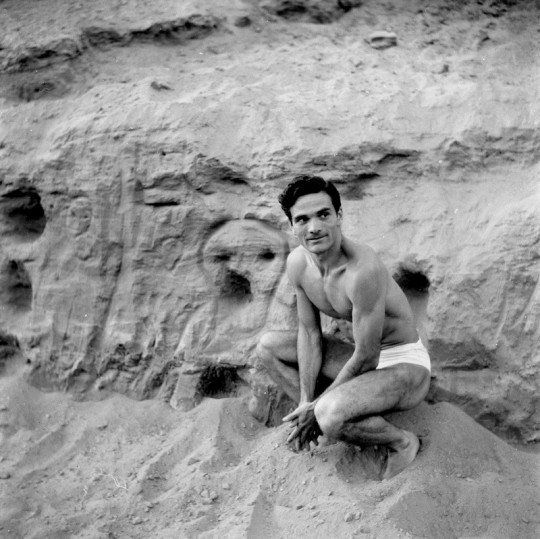
Pier Paolo Pasolini at the Tiber River in Rome. Photo mid-1950s by Toti Scialoja.
#pier paolo pasolini#retro#1950s#rome#history#culture#movies#film#queer#cinema#filmmaker#director#photos#italian cinema#italy#gay#icons#guys#lit#men#ragazzi di vita#📚
272 notes
·
View notes
Text
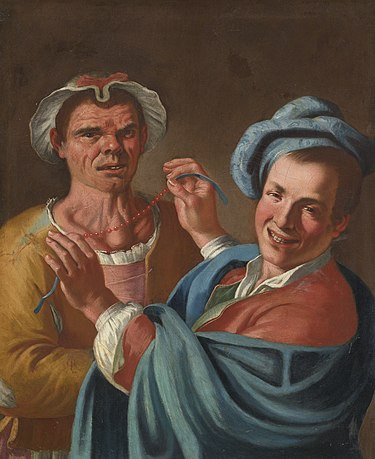
Il femminiello by Giuseppe Bonito (mid 18th century)
The femminielli are a population of third-gender people in traditional Neapolitan culture. While many try and fit them into being either 'feminine gay men' or 'transgender women', the femminielli are best understood by their own unique history and actions. As gender is a social construct, some genders are specific to specific societies, and can't easily be transposed onto other terms!
189 notes
·
View notes
Text
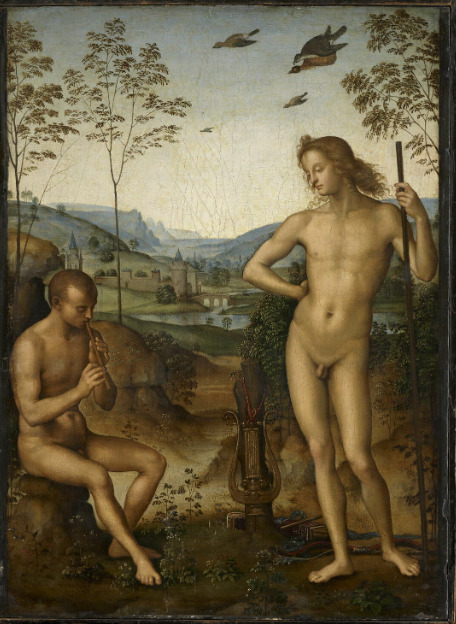


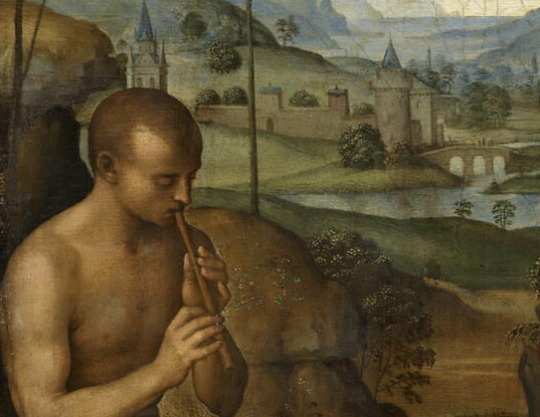
Apollo and the Shepherd Daphnis, Pietro Perugino, 1475-1500
#art history#art#italian art#aesthethic#painting#ancient greece#greek mythology#15th century#rinascimento#arcadia#apollo#shepherd#daphnis#apollo and daphnis#louvre#gay art#homoerotic art#flute#couples#pietro perugino#queer history#lgbt history#neoplatonism
56 notes
·
View notes
Text

Corrado Cagli (1910-1976)
"Partita a carte' (Card game), 1937.
Oil on wood. Private collection. Piacenza. Italy.
As a Jewish and openly gay artist, Cagli became the target of virulent attacks, especially after Italy promulgated its racial laws in 1938. In response to these hostile conditions, Cagli chose to leave his homeland and seek refuge in the United States. In America, he became an influential figure within the New York émigré artistic scene. He found camaraderie among the Neo-romantic milieu centered around the Julian Levy Gallery and the Wadsworth Atheneum.
Center for Italian Modern Art
NYT
44 notes
·
View notes
Photo

Happy birthday to Sal Mineo!
Sal Mineo was born to Italian parents on the 10th of January, 1939 in the Bronx, New York. He was one of the few Italian-American actors of the time who kept his surname, saying he was proud of his Italian heritage.
Sal began acting at a young age, and had his big break at just 17, when he was nominated for an Oscar for Best Supporting Actor for his role as John “Plato” Crawford in Rebel Without a Cause. Sal described Plato as “in a way, the first gay teenager in films,” adding “...you know he had the hots for James Dean.” Sal would later come out as bisexual.
[Image: a young Sal Mineo in a red shirt looking into the camera]
#sal mineo#queer history#bi history#lgbt history#lgbtq#bisexual history#rebel without a cause#queer#lgbt#italian-american
157 notes
·
View notes
Text
inspired by my new mutual bee @thegoodwitch13 I’m lookin for some new mutuals too! I’m Lily, she/her
so interact with this and maybe plz be my friend if you like
- Star Wars (ahsoka is the best thing happening to me rn)
- history (wanna talk ancient Egypt? My love language. Renaissance? Yes. Women spies in ww2? Yes yes yes)
- supergirl, LoT, Batwoman, how DCTV and my favorite girls were screwed over by the CW
- books books books (DONT NOBODY SPOIL A DAY OF FALLEN NIGHT FOR ME plz thank u)
- honestly happy to talk about anything and if you rant about your passions to me I’d love that
okay goodnight for now chilrens

#star wars#ahsoka#ahsoka series#history#egyptology#ancient egypt#italian renaissance#supergirl#supercorp#legends of tomorrow#batwoman#bookblr#samantha shannon#I wish I could write like Samantha Shannon#looking for mutuals#friends#uhm also if you’re a lil fruity that would be great too#queer
32 notes
·
View notes
Note
Hob Gadling who taught himself how to read in order to become a printer with the first book to ever be printed : the bible. Hob Gadling become knight getting a humanist education, learning Latin, Greek, Hebrew and studying the holy text in every iteration. Hob Gadling who has had plenty to reconsider about his faith throughout his life due to his immortality but never his queerness (and Hob Gadling has found out early on he is not straight), suddenly hearing the bible quoted to support homophobia out of nowhere in the 1980s. Hob Gadling pushing back and campaigning without care that he might be endangering the secret of his immortality against this "new translation". Hob Gadling till present days calling that out, loud and clear everywhere he goes to make sure any queer-secretly-religious or religious-secretly-queer kid (and not-kid-anymore) gets to hear it, because he might have his own quarrels with religion but he also knows how important faith can be to someone and he's not about to let bigots manipulate that against his people !!
Listen I’m a whore for religious Hob and this hits the nail on the head. I’m a little brain dead at the moment as I just got back from a bachelor’s party but I’ll attempt to do this ask justice (and if I don’t, I’ll come back to it because I live and breathe for Hob Gadling and all of his complexities).
The first words Hob ever heard recited to him were out of a bible. Growing up, Hob’s parents dragged him to church every day for Mass, where he would hear the Latin words wash over him like a cool, cleansing water and while he didn’t understand the words, they meant something to him nonetheless. When his parents and siblings died, either from the plague or other natural causes, he made sure they got their last rites, the words that would comfort and strengthen their souls on their journey to Heaven, and he took comfort in the fact that those same words would comfort and strengthen his own soul one day. He saw the priest, solemn and wise, cupping his bible with the reverence he showed to the bodies in the ground, a respect and adoration and dedication that shook Hob to his core.
The first book Hob ever touched was a bible. He still couldn’t read it, he simply placed the type letters where he was told, but the unadulterated joy and pride he felt, holding his very first book, the first book he had ever printed entirely by himself, was a feeling like no other. He couldn’t understand a single word of it, but he could’ve recited it with perfect clarity; he had placed that exact same type in that exact same order countless times, eliminating each mistake one at a time until every page was perfect. It wasn’t fancy, just a simple bible for a local parish, but deep down, Hob always thought of that one bible as his.
The first book Hob ever read was a bible. He had traveled to Venice and Florence, centers of Humanist learning and intellectualism, in the early 1500’s to learn Latin and Greek and Hebrew; to study Ancient Greek and Rome society and culture; to immerse himself in the knowledge of history, language, philosophy, art, and literature; to become educated in translation, letter-writing, public speaking, and military affairs; to study Plato and Aristotle and their texts on philosophy. He studied Jewish and Ottoman thought and better understood his own faith all the better for it (and then spent the next two hundred years unlearning all of the prejudices and biases that he had learned from the Christian-centric and racist tutors). From then on, he made it a point to always have a bible in his house. It was a constant between every life he lived; it was the second-to-last item he sold in the 1600’s (the last thing being his portrait of his lovely and lost Eleanor and his son Robyn) and the second thing he bought as soon as his fortune turned a tide (the first being an apple, an irony that he and Death chuckled over later). Even when England was under Protestant rule, as it would be for a long time, he kept a Latin bible tucked away, out of sight but never out of mind, and when the stresses of his daily life and the mind-bending reality of his everlasting life weighed heavily on him, he would pluck that bible off the shelf (he never had to dust it off, he kept it as clean and pristine as it was when he bought it) and let those cool, cleansing words wash over him once again.
This sounds like a fic, I just realized, and in some ways it is, but it’s also a deep reality of who Hob is and what he holds in utmost importance. I can also offer this little-known tidbit of information (that I think the Sandman fandom would benefit from knowing): homosexual relationships were incredibly common in the early Renaissance, at least in Italy (though if the Italians, with their proximity to the Papacy, were willing to risk it for the biscuit, the rest of Europe was probably jumping on the bandwagon too).
Among nobility, men were expected to marry around the age of 30 whereas women were expected to marry around the age of 15-20. Men were also expected to be sexually experienced in their marriage. So the question is, who exactly are they having sex with? And if you just said “each other” out loud, you’re absolutely correct. In Italian culture, noble men would frequently have sexual relationships with each other prior to getting married to their wives. Now, a lot of these men would never identify as homosexual as we would define it today; these sexual relationships were more along the lines of a gender role to be performed than any real attraction towards men, and it was seen as more of a mentor/mentee situation-the older man in the relationship was showing the ropes of sex to the younger man in the situation and then, when the older man got married, the younger man would then find someone younger to mentor. It was a way of building friendships and bonds, which sound laughable to us now, but were a genuine and deeply respected aspect of society; the feelings they had for each other were strictly platonic in the majority of cases (though gay people have always existed and I’m sure Hob Gadling would’ve reveled in this aspect of society) and would lead to business and family connections later down the line.
I want to stress that these connections were not romantic in nature; it was just a participation in society, but it also means that Hob Gadling has definitely had sex with men before, especially if he had (as I said about halfway through this extraordinarily long post) traveled to Italy for his education. He would’ve first been subservient (as the younger men were) and then moved to a more dominant role once enough time had passed for people to believe that he was getting closer to the age of marriage. He definitely would’ve realized that he was attracted to men then, if he hadn’t already in his hometown as a teenager. What’s more, these men engaged in homosexual relationships were also devout Catholics! Religion had absolutely nothing to do with it, and this would’ve been Hob’s first and lasting impression of homosexuality. Religion has nothing to do with it! It’s simply a part of society, an aspect of the larger culture that most ignored in favor of minding their own business. He would’ve been horribly enraged at the fact that modern Christians took up arms against homosexuality when Christians have had a long (long) (long) history of homosexuality and queerness.
And he’d teach that. In every class where it was relevant, in every conversation where it came up, in every religious debate. He’d make a point of mentioning that history that so many are so quick to cover up because it’s important. It’s important to him and it’s important to other queer people, not because it’s a part of queer history (again, for the vast majority of these men, they were not gay or queer in any way) but because it’s important to understand just how recently Christianity’s crusade against queer communities has cropped up (that’s not to say, however, that the church in any way condoned Renaissance Italian men and their gay sex because they decidedly did not, but it wasn’t an act punishable by death, nor was it punished at all. If anyone had a problem with it, it was their eventual wives, but they had a bigger issue with the prostitutes that their husbands would see on a regular basis even after their marriage).
So yes, to sum up my incredibly rambling post, Hob Gadling 100% has a very unique and deep connection with his religion, though he keeps it very separate from his relationship with his sexuality because that’s how it’s always been. He’s a Godly man and he’s a queer man and the two can coexist.
#thank you for the ask!!#this was such a delight to write#I’ve been ranting to my roommate about this for days and I’ve just been procrastinating writing a post about it#so thanks for the excuse to get it all down!#I don’t have spurces for any of this except for Dr. Clines (my wonderful history professor)#and he has a PhD in Renaissance Italian history so we all take his word as gospel#but I’m sure there are plenty of resources for anyone who wants to find them!#I can also ask my professor for some of his sources and add them if anyone wants them!#but yeah I love queer christian Hob Gadling#I’m so sorry this is so long#the sandman#sandman netflix#hob gadling#queer history#christian history#neil gaiman#sandman neil gaiman
62 notes
·
View notes
Text
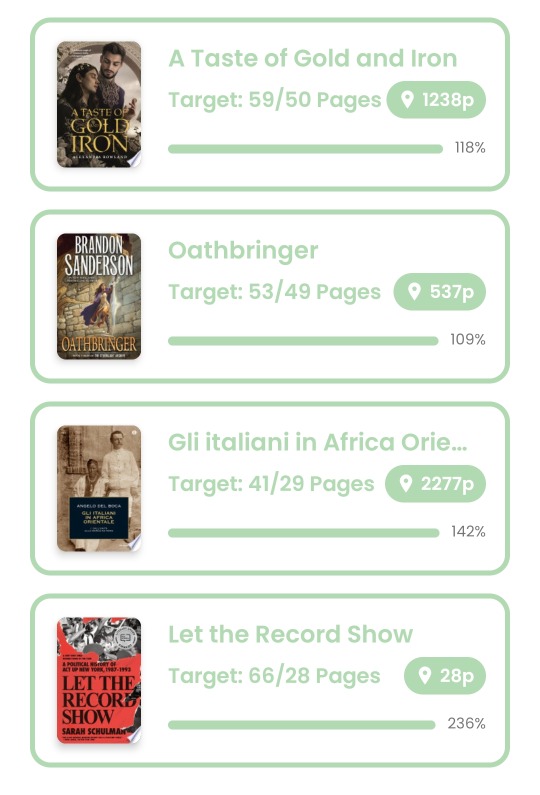
Reading all of these on the same day is a constant whiplash
#the order i went with too#something with an almost old school fantasy style then nonfiction about activists during the hiv crisis then switched to romance fantasy#and then nonfiction about italian colonialism#I'm going insane here#also i know i shouldn't have started let the record show but i got it 2 years ago and i did want to read something about queer history so
2 notes
·
View notes
Text
On April 24, 1991, Deep Red was released on VHS in Germany.

Here's some Macha Meril art to mark the occasion!
#deep red#profondo rosso#the hatchet murders#macha méril#dario argento#thriller#70s horror#giallo#giallo film#giallo art#italian thriller#horror film#horror art#horror movies#horror#the last drive in#cinema insomnia with mr. lobo#queer film#queer horror#christmas horror#movie art#art#drawing#movie history#pop art#modern art#pop surrealism#cult movies#portrait#cult film
3 notes
·
View notes
Text

#wilhelm von gloeden#old phography#photographer#queer#lgbtq#lgbt history#queer history#gay#vintage gay#vintage photography#young man#sicily#italian
15 notes
·
View notes
Text
me, learning entire languages for the queer fandoms, fanfics/media?.. more likely than you think!
(also i need to share this edit because he’s my fan cast for Henry Winter (or Richard). at me, idc.)
https://youtu.be/hvmKOtumG40
#jk i wanted to learn them anyways but my driving force be the queer.. always#im looking at#boreo#tgf#obvi#but also some history ships i have cause im a nerd#French - mostly Été 85#but def others#omfg im obsesseeeed with#with the music too#and movies and lit in gen just like all the languages tbhhh lol#buuut LOVE Alain Delon#he is just OOF#and italian honestly because i just love it tbh and grew up with old relatives speaking it#also i love history stuff for the arts of all these... i just like the catchy vibes of this#cause its a lil true too tbh lol#tsh#henry winter#anyone wanna fan out with me#about#Alain Delon#hit me up#lol im obsessed#richard papen
10 notes
·
View notes
Text
I am coming to the realization that watching Goncharov in freshman history class is NOT a universal experience. In other completely unrelated news I think that one of my teachers may have hated children.
#Goncharov#martin scorsese#me and my best friend were only allowed ONE CLASS together#and it was history#and Mr. Scott was actually a great teacher.#cause we basically learned how to do research by identifying inaccuracies of Italian and Russian history#and yes he did fast forward through *those* scenes#which meant Nao and I basically ran home to watch my dad’s copy#but like he just let the violent scenes play out?!?!#I was fourteen and watching goddamn Goncharov on the regular#being a queer weirdo art kid: it took over my identity for a few years.#not me giving a presentation in English class on my fav Goncharv/Andrey fic#i am cringe but i am free#I’m so glad that everyone can now know it’s greatness#unreality
15 notes
·
View notes
Text
god i love lotr especially the online fandom bc i might not be a part of it but knowing that one of my dads most formative pieces of media something that he told me stories about in great detail (he knows the lore by heart) making me grow up hearing about it, is also some 17 year olds source of gay fanfiction is simply the best thing
#im not kidding btw lotr was a huge part in the bond me and my dad have its the reason why my dad likes medieval fantasy#which he passed down to me so ots the reason i lile medieval europe fantasy and history#but my favorite book was never lotr its another one by some italian lady#but i always considered it a like???? dude bro heavy metal liker thing. like its so nerdy. the stereotypical kind kf nerdy#to me and stuff thats what lotr meant. heavy metal guys in their 30s dad time and big book.#so finding a whole community of younger queer people who like it online in a COMPLETELY different way is SO NICE#inspires me to actually finish reading the book#(it was kind of boring for me granted i was 12 and had just rea what i perceived as the coolest books ever)#(like the starting section is genuinely very boring but i picked it up again one of these days and actually likes it)#(even if its a bit of an infodump that could be conveied inside the story)#(but you could argue it *is* inside the story seeing that the author writing it is a character#(not a character in the book like. he isnt tolkien tolkien wrote his books introduction woth full imersion in my mind i think)#(but even if it seems a little bit unnecessary it actually provides a lot of insight to the hobbits history that is pretty cool to the stor#it gives ot that extra layer of understanding of the whole universe and middle earth which really increases imersion)#(((ive never read kt but i did watch the movies which YES i know isny The Real Authentic Thing give me a break)))#sg.txt
3 notes
·
View notes
Text
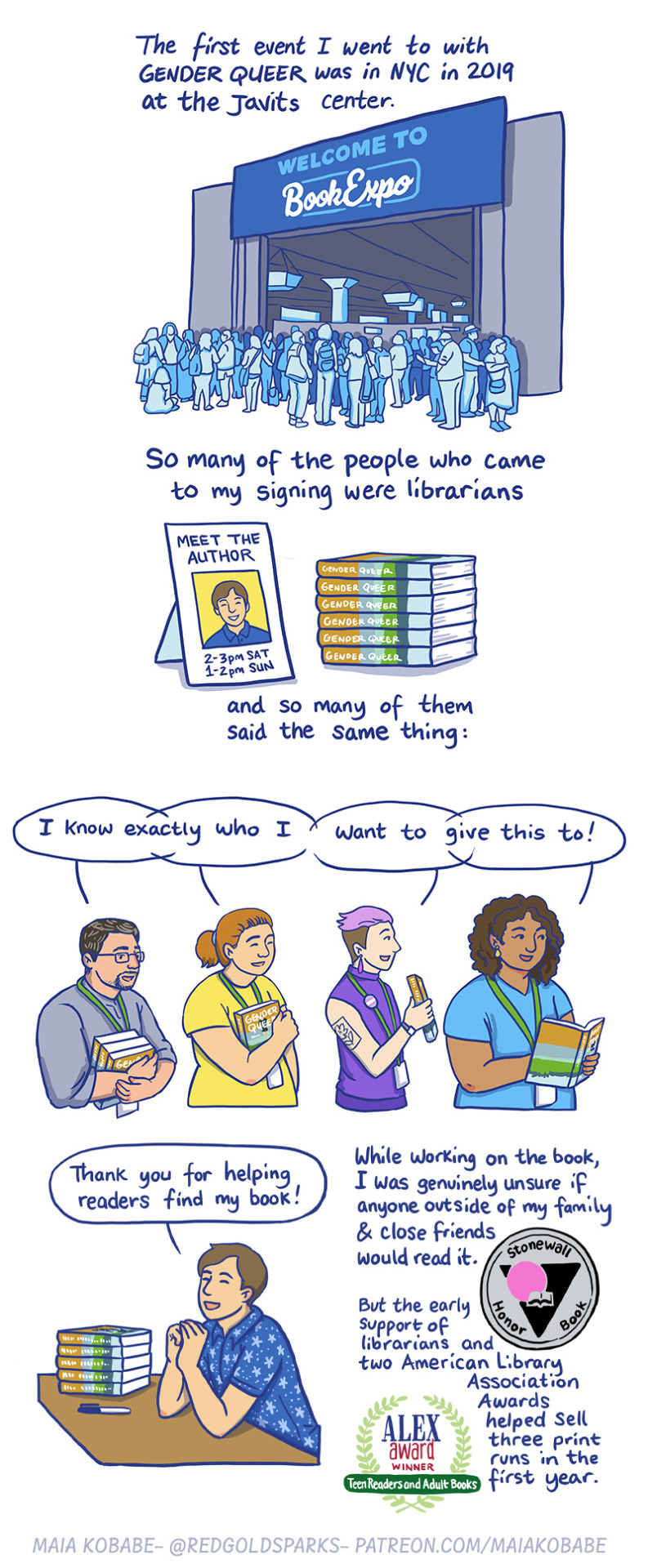
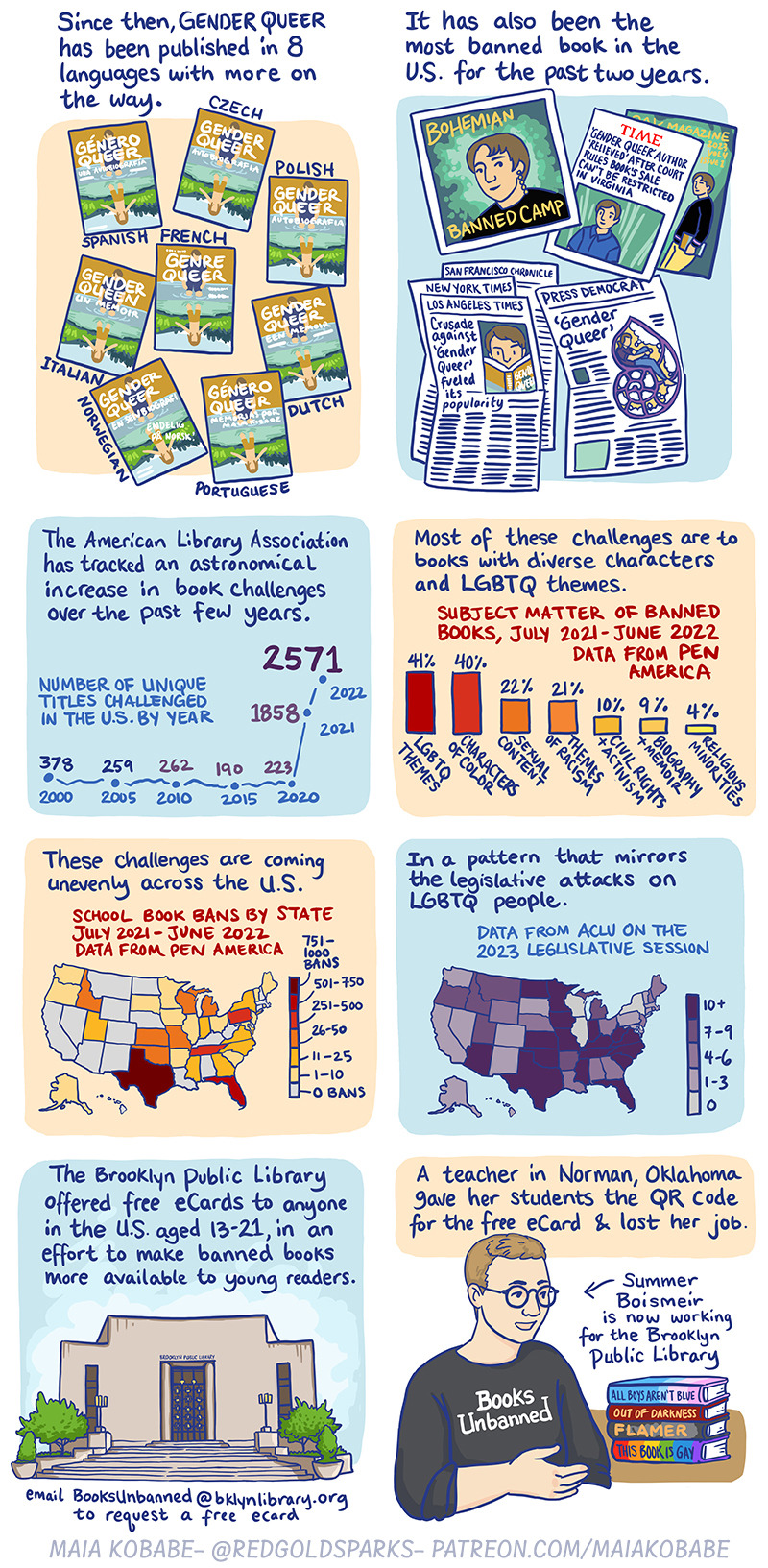
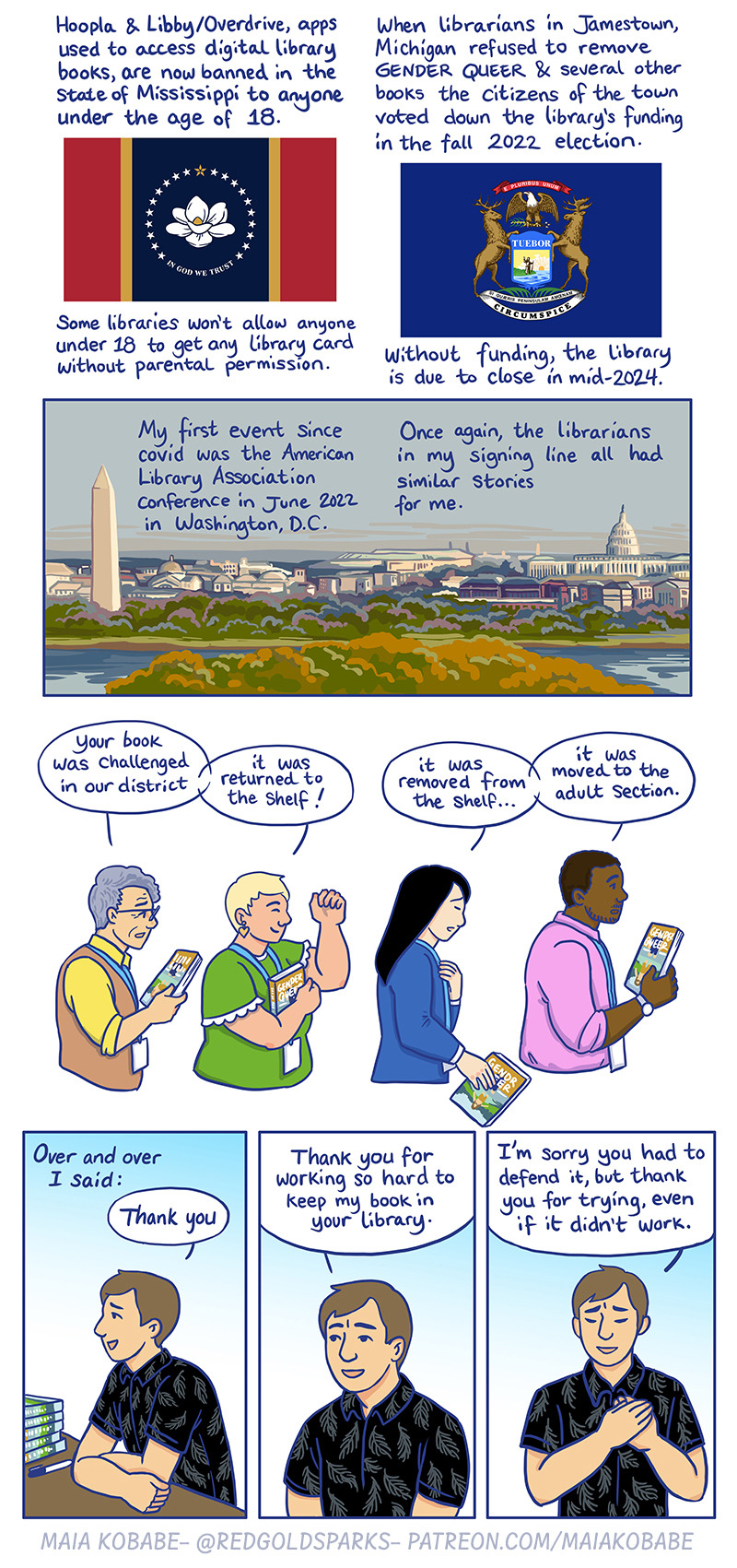
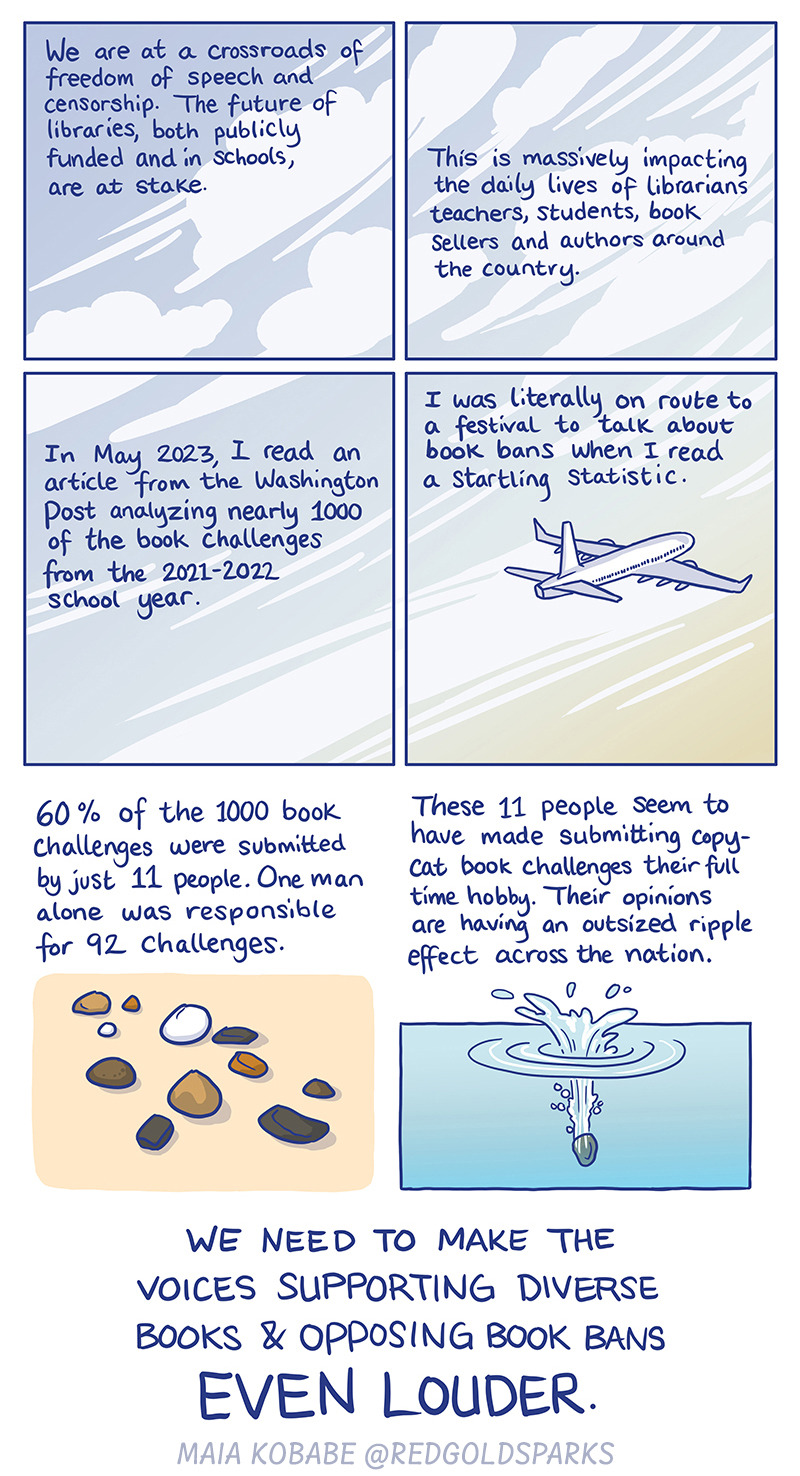
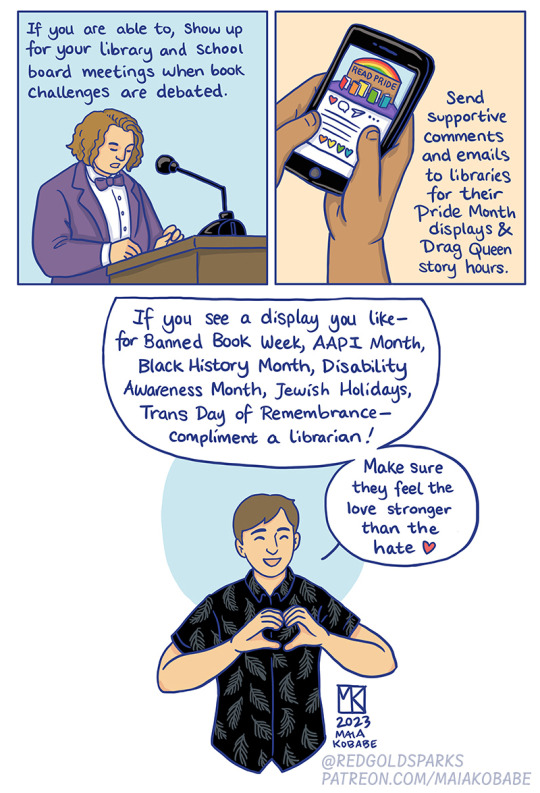
My very last comic for The Nib! End of an era! Transcription below the cut. instagram / patreon / portfolio / etsy / my book / redbubble
The first event I went to with GENDER QUEER was in NYC in 2019 at the Javits Center.
So many of the people who came to my signing were librarians, and so many of them said the same thing: "I know exactly who I want to give this to!"
Maia: "Thank you for helping readers find my book!"
While working on the book, I was genuinely unsure if anyone outside of my family and close friends would read it. But the early support of librarians and two American Library Association awards helped sell two print runs in first year.
Since then, GENDER QUEER been published in 8 languages, with more on the way: Spanish, Czech, Polish, French, Italian, Norwegian, Portugese and Dutch.
It has also been the most banned book in the United States for the past two years.
The American Library Association has tracked an astronomical increase in book challenges over the past few years. Most of these challenges are to books with diverse characters and LGBTQ themes. These challenges are coming unevenly across the US, in a pattern that mirrors the legislative attacks on LGBTQ people.
The Brooklyn Public Library offered free eCards to anyone in the US aged 13-21, in an effort to make banned books more available to young readers. A teacher in Norman, Oklahoma gave her students the QR code for the free eCard and lost her job. Summer Boismeir is now working for the Brooklyn Public Library.
Hoopla and Libby/Overdrive, apps used to access digital library books, are now banned in Mississippi to anyone under 18. Some libraries won’t allow anyone under 18 to get any kind of library card without parental permission.
When librarians in Jamestown, Michigan refused to remove GENDER QUEER and several other books, the citizens of the town voted down the library’s funding in the fall 2022 election. Without funding, the library is due to close in mid-2024.
My first event since covid hit was the American Library Association conference in June 2022 in Washington, DC. Once again, the librarians in my signing line all had similar stories for me: “Your book was challenged in our district"
"It was returned to the shelf!"
"It was removed from the shelf..."
"It was moved to the adult section."
Over and over I said: "Thank you. Thank you for working so hard to keep my book in your library. I’m sorry you had to defend it, but thank you for trying, even if it didn't work."
We are at a crossroads of freedom of speech and censorship. The future of libraries, both publicly funded and in schools, are at stake. This is massively impacting the daily lives of librarians, teachers, students, booksellers, and authors around the country. In May 2023, I read an article from the Washington Post analyzing nearly 1000 of the book challenges from the 2021-2022 school year. I was literally on route to a festival to talk about book bans when I read a startling statistic.
60% of the 1000 book challenges were submitted by just 11 people. One man alone was responsible for 92 challenges. These 11 people seem to have made submitting copy-cat book challenges their full-time hobby and their opinions are having an outsized ripple effect across the nation.
WE NEED TO MAKE THE VOICES SUPPORTING DIVERSE BOOKS AND OPPOSING BOOK BANS EVEN LOUDER.
If you are able too, show up for your library and school board meetings when book challenges are debated. Send supportive comments and emails about the Pride book display and Drag Queen story hours. If you see a display you like– for Banned Book Week, AAPI Month, Black History Month, Disability Awareness Month, Jewish holidays, Trans Day of Remembrance– compliment a librarian! Make sure they feel the love stronger than the hate <3
Maia Kobabe, 2023
The Nib
19K notes
·
View notes
Text

Corrado Cagli, “Segni Zodiacali” (“Zodiac Signs”), 1934, a study for a fountain in Terni, Italy.
Archivio Corrado Cagli, Rome Italy / NYT
39 notes
·
View notes